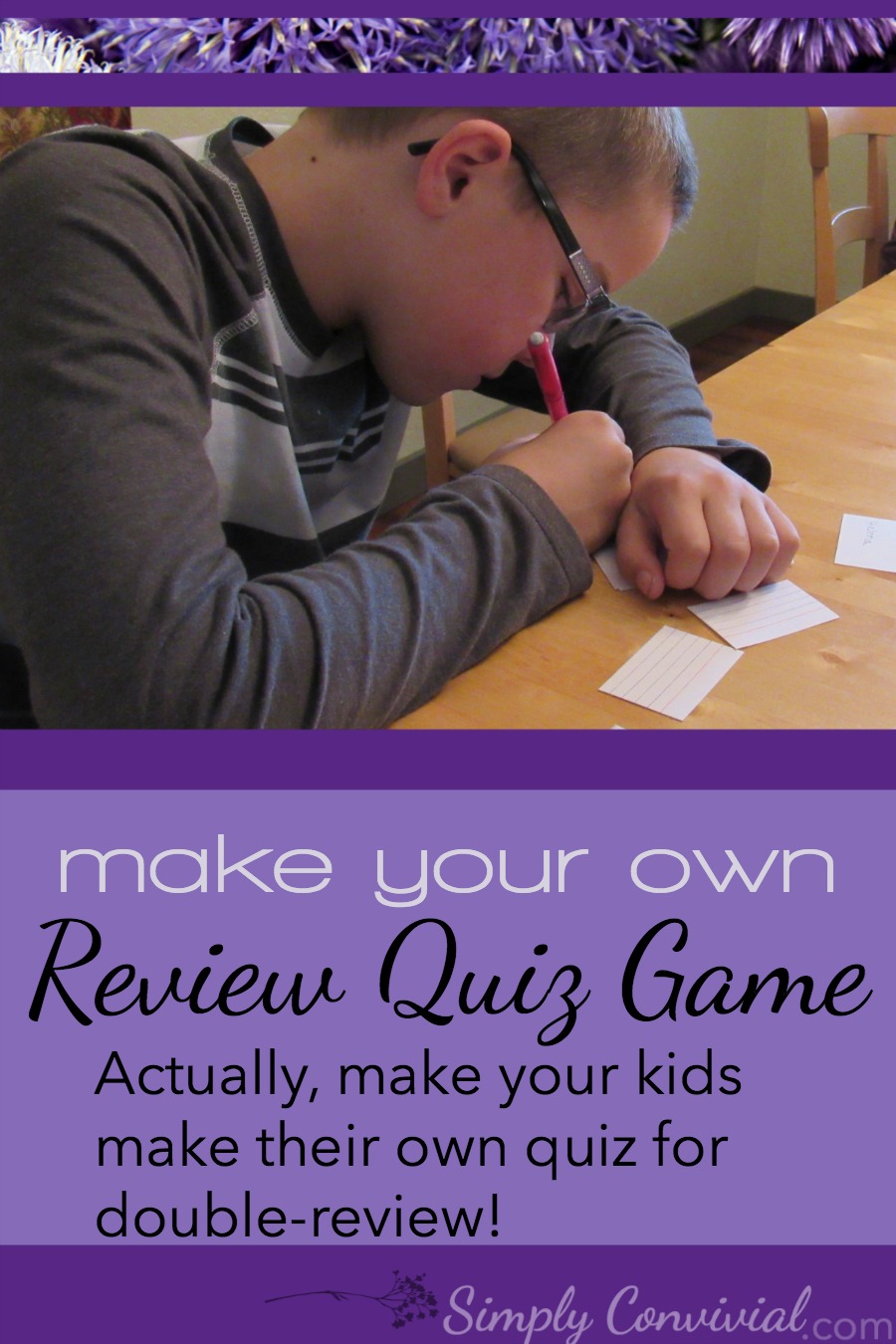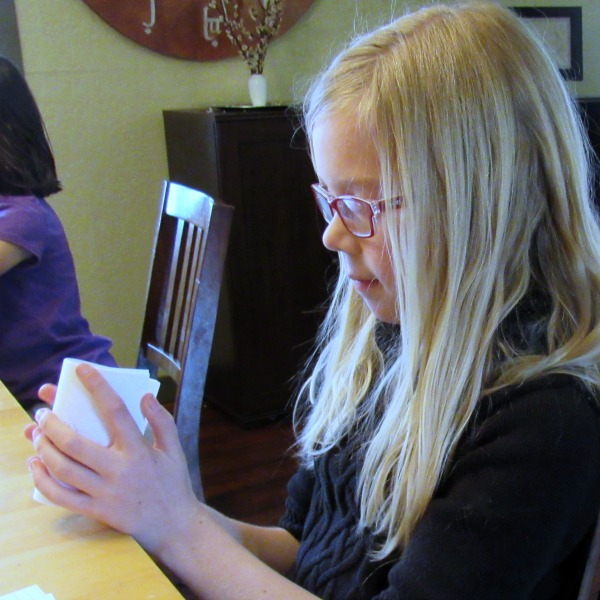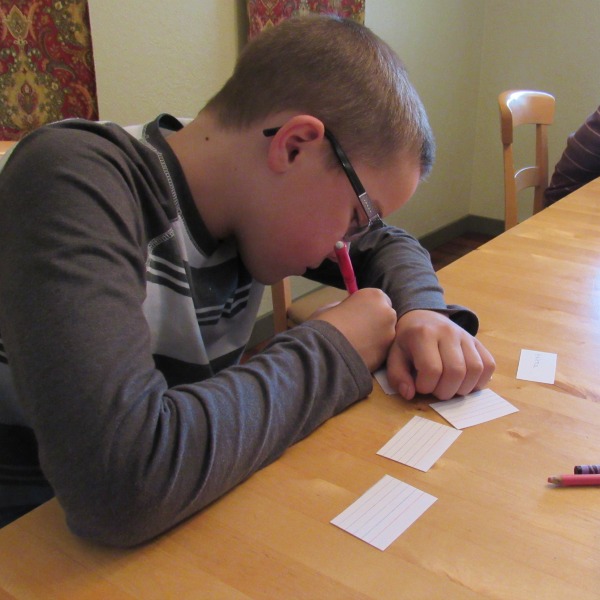End-of-chapter quizzes. Fill-in-the-blank comprehension questions. Tests.
We don’t do them.
But the seventh law in The Seven Laws of Teaching states that “no time is wasted which is spent in review.” However, it stipulates, it should be gone over in new ways to really cement the information.
Well, I’m not sure if we’re really cementing information or not, but we are motivating the kids to go back over what we’ve learned, to think back over things at different angles, and they think the whole process is fun. It’s the once-per-term class day they look forward to most.
That might be because it involves candy.

How to Play Review “Jeopardy”
This review game is not strictly Jeopardy, but that’s what we call it. It could work with only two students, would be better with three, and our current class of 5 is tops for my patience, but could be adjusted for more players as well.
We use this game to review and remember what we’ve learned in history, geography, and science, which we do during our group lessons (aka “Elementary Lessons”).
Supplies
- Index cards
- Popsicle sticks and cups or more index cards
- Timer
- Candy
Assignment
A couple days before you’re planning to play the game, write one noun from your lessons on each of the index cards. I think 4-5 per student is a good number.
So, for example, some of our cards this last time included Parthenon (geography), aorta (science), and homeostasis (science). This time around we saved our history review for a different game, which I’ll tell you about next week.
One card, one thing.
Deal the cards out, name down, to the students so they get an equal number but no one can see what you’ve written on them.
Assignment: You have been given the answer. On the other side of the card, write a question where that is the correct answer.
Make sure you clarify things that you and I know shouldn’t need to be clarified, but we do:
- Yes, what I wrote has to be the right answer to your question.
- You can’t scour the encyclopedia or wikipedia for obscure facts and use that material for your questions. Your fellow students should know the answer from your question based on our readings over the last two months. This is a review game, not a research game.
- Practice saying the words in your question and answer – you’re going to have to read these aloud. Be ready.
- Questions need more information in them than straight dates.
I always look over the questions my kids come up with (or help them write them, in the case of my 8-year-old) to make sure they’re correct and valid. I didn’t once, and I regretted it. Both they and you will appreciate it if you catch a question that doesn’t work before the game is underway.
Game Play
Each player has their super-secret stack of Q&A cards and they are seated around a table such that they can read their cards without others being able to spy the answers.
Each player has the names of the other players in front of him, in random order. This can be achieved by popsicle sticks (one name per stick) name-down in a cup for each player or by writing each player name on an index card (for each player) and having them mix them up each round.
Starting with the youngest (or only girl or some other special person) and moving clockwise around the table, the active player:
- Reads aloud his question
- Selects a stick or card and calls out the name
Then the parent-teacher turns on the timer (for 30-45-60 seconds, depending on your group and your timer) and the selected student attempts to answer the question.
There is no penalty for a wrong answer. If the question is not answered correctly or is simply not answered at all, it goes to the back of the player’s deck of question-cards. Other players do not – yet – get a chance to answer.
If he gets it right, then he gets the card and places it in a pile on the table in front of him (his point stack).
Play moves clockwise around the table in this fashion. When all of a person’s name-cards have been used or all the sticks pulled, just mix them up and turn them over or plop them back in the cup.
If a question goes unanswered a second time (by a different student – repeats are redrawn), then the writer of the question gets the point. The card goes into his point stack.
Continue to go around until all the cards are in people’s point stacks. Count up the cards and give out candy, one per card-point.
Double-Review Brilliance
The game part is basically a quiz, but one you didn’t have to prepare and don’t have to grade!
The real value in the game, I believe, is in the question-writing. When the students are coming up with their questions, they’re thinking about the thing given them as an answer and crafting information in such a way that it will be true yet not obvious (because they want the point themselves, after all).
Getting the kids to think creatively about what we’ve been learning and get excited to be quizzed (which they do because it’s a game and they are also the ones doing the quizzing) is a win-win.
It’s worth some candy.



Love this! I’ve done jeopardy-style games, and I’ve had my kids craft questions from their studies, but haven’t combined the two. Thanks for the idea… this will be fun!
Apparently I am enough of a dork that I would like playing this game as well. =) Good thing we have Trivial Pursuit and Jeopardy. My kids are going to love this!!
I love this idea and saved it in my Evernote so I could easily come back to it and find it when I was ready. Now, I realize I need a little help tweaking it so it will still work for our family. I hope you can help me, Mystie. Here’s my situation…my kids won’t be studying the same material next year. Some of mine are in high school and one isn’t. They just don’t all need the same level of challenge so we do different studies for history, science, etc. We do actually do some areas of study together, but not really the ones where we would utilize review. Is there still some way where we could all play and review together, but each with their own material? Thanks. Oh, and is there a way to play together the Hangman game too? Thanks again.
Hi Karin! I’ve been thinking about it, but I can’t think of how to do a “quiz show” type game when all the players aren’t drawing from the same knowledge base. Sorry. :(